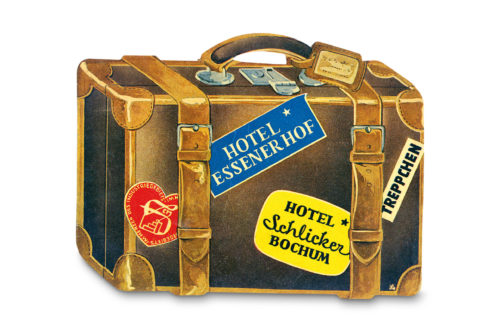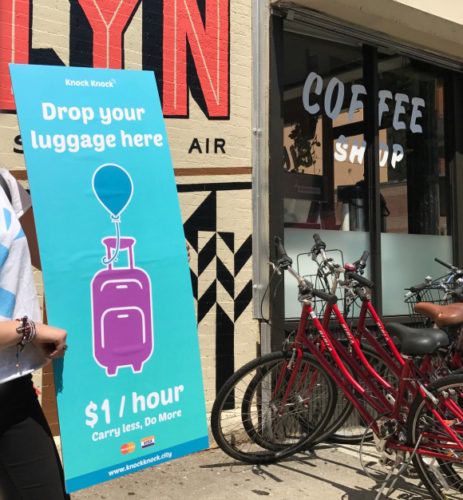
There’s that ‘in-between’ time – when you arrive in a town before hotel check-in time, or when you checked out of your hotel or Airbnb and want to do some sightseeing – when you need a place to leave your luggage.
Hotels will sometimes store your gear, but in a story for CNBC this week, I found a group of apps that match travelers seeking short-term bag storage with coffee shops, restaurants, gift shops and other businesses with strage room to spare.
These luggage storage networks, such as Vertoe, LuggageHero, Stasher, Nannybag, Knock Knock City, Bounce and others, have apps that lead users to vetted nearby drop-off spots, with payment made online.
When dropped off, security ties are usually attached to bags to prevent tampering. Insurance is included in the fee and, after pick-up, users are invited to rate the experience online.
Storage fees vary and are charged by either the hour or the day:
Both Knock Knock City and LuggageHero charge $1/hour or $10/day with a one-time handling fee of $2/bag. Bounce charges $5.99/day. Nannybag charges $6 per bag for the first day and $4 per bag for each additional day. Stasher’s fees are $6/day/per item and Vertoe’s fees start at $5.95 per day/per item (overnight storage counts as two days) and vary by location.
The storage-app ‘industry’ is still young and most company founders I spoke with said they decided to get into the business after finding themselves lugging their luggage around a city after checking out of an Airbnb.
“We started in New York City and Brooklyn with people offering bag storage in their apartments on Craigslist, like Airbnb for luggage,” Selin Sonmez, co-founder of Knock Knock City, told me, “But we found the business hours posted for some people’s homes weren’t reliable or always accurate and others required users to walk up flights of stairs with their suitcases.”
Knock Knock City now also operates in San Francisco, Boston, Washington, D.C., Seattle, Philadelphia, Chicago and Miami and only partners with ground floor venues that have strict business hours. Sonmez said any location with an average star rating below 3.5 (out of 5) is removed.

Like the other luggage storage app services, the list of Knock Knock City partner sites is eclectic. Customers can store their bags at bike shops, clothing stores, restaurants, a massage therapist’s office, an eyebrow bar, at hotels and in hostels.
In addition to helping businesses put unused or underutilized space to income-producing use, “We’re helping local economies by getting travelers to explore neighborhoods and getting foot traffic in the doors,” said Sonmez.
That’s the pitch that convinced ATLAS Workbase, a coworking space by Seattle’s Space Needle, to sign up as a Knock Knock City site.
“There are a lot of Airbnb rentals in this area and a lot of tourists, so it solves a real need,” said Kim Burmester, ATLAS Workbase vice president of sales and marketing, “But our real goal is to get traffic in here as our key target audience is the traveling professional.”
As convenient as storing a suitcase at a coffee shop for a few hours may be, travelers who don’t want to deal with any baggage hassles have other options.
Travelers can send luggage (and golf bags, ski and snowboard gear or bicycles) ahead with door-to-door shipping services such as Send My Bag, Luggage Free or LugLess (part of the Luggage Forward family) that offers both drop-off and door-to-door luggage shipping services. (Pricing depends on destination, weight and how soon you want your bag to arrive).
Or, for $9.95/month and $99 per standard U.S. shipment, you can skip worrying about making travel arrangements for your suitcase altogether.
Dufl sends customers a suitcase to be filled with clothes or accessories and then picks up the suitcase and stores the items in a “virtual closet.” Customers can request that the suitcase, filled with any of the stored items, be waiting for them at a hotel and then, after their trip, return the suitcase and the clothes back to Dufl for dry cleaning and storage until the next trip comes around.